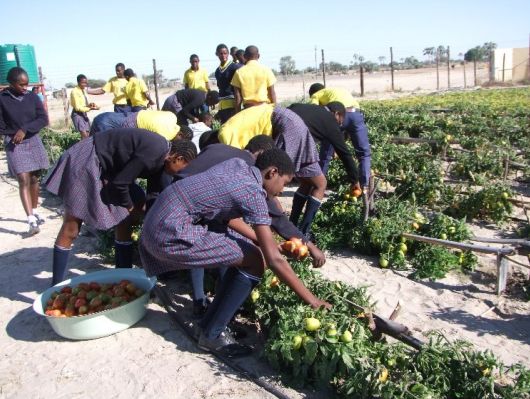Namibia.htm
Assvoelness School garden, Northern Namibia
The school is situated in a very small village, about 40 km from Tsumkwe, the major city in the Nyae Nyae
Conservancy. The school itself is in the neighboring Na Jaqna Conservancy, Northern Namibia. Both conservancies are home to indigenous groups J’’/hoansi and !kun San. The students there range from grade 3 to
grade 7 and most of them come from the surrounding San villages. Because many learners’ families live in the
villages, the children need to stay in a hostel that is currently being renovated by the Rotary.
The food the school receives is bought thanks to monthly donations and a lot of what the children consume is
based on cheaper, easier products such as maize meal, canned pilchards and other dried or canned goods.
The idea of building a school garden was initiated a few years ago, but not activated. Our goal is to reinvigorate that idea for many reasons. First and foremost, the garden would allow some form of independence and
sustainability for the school community. The children would eat more healthy food, especially fruits and vegetable. The garden would serve as a wonderful laboratory for the school and could be used by the teachers. One
of the very important aspects of the project is that the teachers are on-board with it. They have designated the
agriculture teacher as the future garden manager, and they have already discussed how they can use the garden in different topics such as math, sciences, language, storytelling, etc.
A unique aspect of the project is its cultural philosophy. San communities traditionally use nature as a training
ground, and many children are educated in the bush, around the villages where they grow up. They learn from
plants and animals, they learn to track animals and to identify different species. At the same time, they learn
other skills such as teamwork, creativity, and resilience. Having a garden in the school would offer some continuity in learning to use nature as a training ground.
Further, the garden can teach farming techniques to young students who can bring them back to their families.
Currently there are some gardens in most San villages but they are operated with moderate success. The children may be the ones to bring their knowledge home and help their families with new approaches to gardening.
This project will be a collaboration between Agri Connexions Africa and the Auas RC Windhoek. Agri Connexions Africa (ACA) Trust was established in 2014 to fill a gap in the provision of community-led, sustainable agricultural training services in northeast Namibia. It has successfully installed several school gardens in NE Namibia. Typically, new school garden installations involve the setup, the design and installation of the drip irrigation system, help with the establishment of an agriculture club at each school, training and mentorship on sustainable organic agriculture, and host field events to showcase the garden to the local community.
The San peoples (also Saan), or Bushmen,(a derogatory term) are members of various Khoe, Tuu, or Kxʼaspeaking indigenous hunter-gatherer groups that represent the indigenous inhabitants of Southern Africa.
Several years ago, Peter Jeschofnig of the Glenwood Springs Sunset RC, lived in Namibia and was very active in the Auas RC and the Windhoek RC. The Covid pandemic allowed Peter to participate in the weekly
Zoom club meetings and the pre-planning of this school garden project. The project is expected to cost about
$8,000 including drilling a water well and installing a drip irrigation system. It is expected that this will be a district grant with about half of the cost covered by a Rotary club in Germany and the other half by one or more
clubs in D-5470.
This will be a very affordable club project, assuming $ 2,000 coming from a club and $ 2,000 from a district
match.





